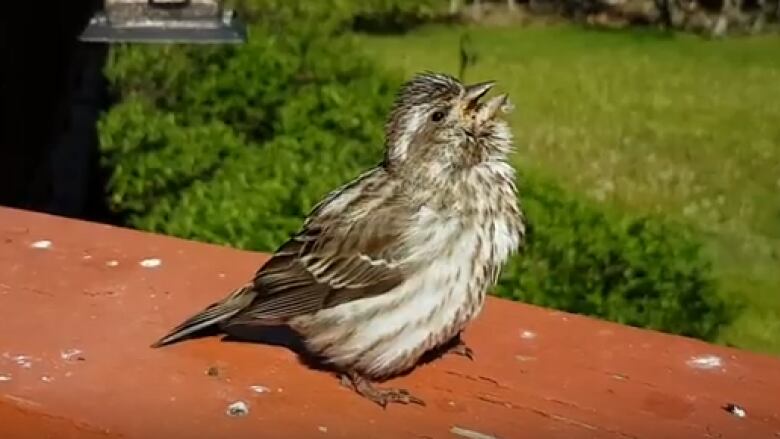Keep an eye out for infectious bird disease, says wildlife pathologist
Trichomoniasis was first documented in Atlantic Canada in 2007

Bird feeders are a popular wayto get a front row seatto the beauty of winged wildlife, but they can also givepeople a close-up view of the darker sides of life in the wild.
Rebecca ClarkeMacInnis,fromHammond's Plains, N.S.,noticed a purple finch on May 30ththatwas not as mobile as the other birds visiting her backyard feeder.
"The poor little thing, she started to havetrouble swallowing right at the feeder," Clarke MacInnissaid.
"She was just perched on the railing on the deck and she was really slow and her beak was open and she was trying to swallow and trying to breath and you could just tell that she was having major trouble."
Clarke MacInnisrecorded the struggling bird and shared the video with a local wildlife group to determine if it was abird disease called trichomoniasis.
The Canadian Wildlife Health Cooperative (CWHC) shared the video on their website saying the bird wasexhibiting the classic signs of the infectious disease.
Fatal in birds
A microscopic parasite (Trichomonas gallinae)causes the disease trichomoniasis which is mainly aninfection in the mouth and throats of birds, making them unable to swallow. It can also cause birds to have wet or ruffled feathers and food around theirface or beak.
Trichomoniasismainly affects seed-eating birds like Americangoldfinches and purple finchesin Atlantic Canada. The illness is well documented in various birds and is known as canker in pigeons and doves andfrounce in raptors.
The parasitedoes not pose a threat to cats, dogs or humans but pet birds and poultrycould be infected according to the CWHC.

There areno lab-confirmed cases so far this year, but that is not uncommon at this time of year.
Most of the time members of the public report sightings of birds with symptomsto the CWHC. If a dead bird is found, they may be brought to the Atlantic Veterinary College (AVC)in Charlottetown for further testing.
Experts theretest the birds to confirm the disease-causing parasite is present. The first reported cases of trichomoniasisin the Atlantic region were in 2007.
Cases reported across Atlantic Provinces
In 2017, 107 cases were reported to the CWHCfrom theAtlantic provinces. Of those, 18were lab-confirmed, including one in Labrador for the first time. Megan Jones, Atlantic regional director forthe CWHC, says the reported cases are just the tip of the iceberg as many sick birds remain undetected and unreported.
"It looks like it can be transmitted at bird feeders and so we want people to be aware that this disease has been here in past summers and we are getting some rumblings and some suggestions that it could be coming back again this year," said Jones, who is alsoan assistant professorof Wildlife Pathology at AVC.

Jones said they are asking people with feeders to be vigilant about the health of the visiting birds.
"We always recommend that it is nice to plant native plants in your garden and that will attract birds on its own," Jones said.
"The birds aren't relying on your feeders in the summertime and so it is a matter of risk versus benefit ... if the the disease has been found in your area, definitely the best thing you can do is take the feeder down."
Keep bird feeders clean
There is information on the CWHCwebsite about sightings in the Atlantic provinces and about thetypes of feeders that best limit the spread of the disease.
To prevent its further spread, the CWHChad these recommendations:
- Clean bird feeders and bird baths a few times a monthusing soapy water and thena weak solution ofdomestic bleach. The feeder should be rinsed thoroughlyand dried out before putting it up again.
- Avoid table feeders where different birds can sit directly on the seeds. This increases the chances of spreading the parasite.
- Keep the seeds in the bird feederdry. Wet seeds create a more suitable environment for the parasitesand increasethe chances of infecting other birds.
- Report any sick or dead birds to the CWHC sopotential cases can be tracked.
- Wear gloves when dealing with the bird feeders even though this disease is not contagious to humans, birds can carry other diseases that can be passed on to humans and other pets.

If there are reports of a known outbreak of trichomoniasisin your area, the CWHCrecommendstaking down all bird feeders and artificial water sources.
Feeders should not go back up until cold weather and frost returns in the fall and winter.
Safety of the birds comes first
Clarke MacInnissays she is not taking any chances and the backyard bird feeders arealready down.
"I really miss seeing all the birds and it is kind of heartbreaking when you see the other birds that are healthy coming back that are looking for food and there is nothing there," Clarke MacInnis said.
She hopes to see the birdsreturn in the fall after her feeders have been disinfected once again.












_(720p).jpg)


 OFFICIAL HD MUSIC VIDEO.jpg)
.jpg)



























































































